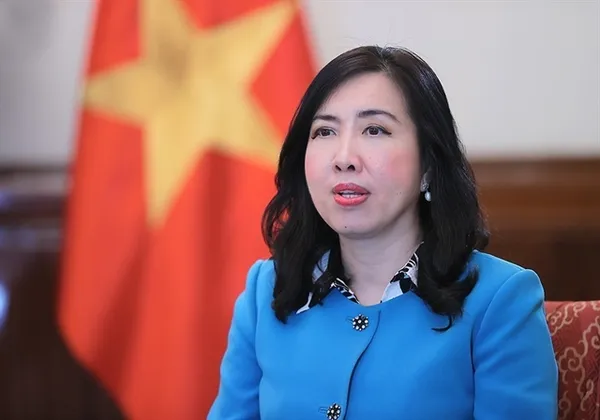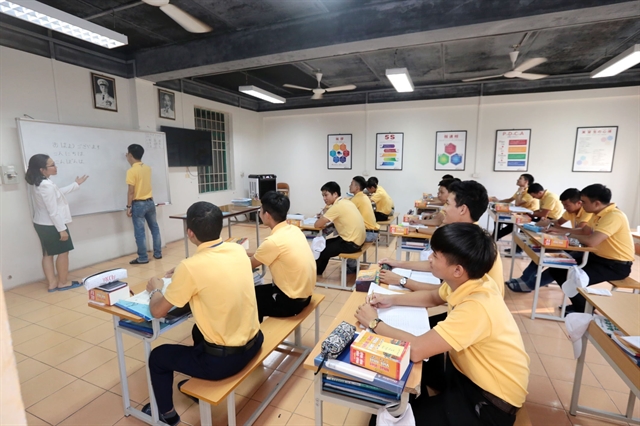 Opinion
Opinion

A new Government decree has been issued detailing increased fines for agencies that illegally send workers overseas and for workers who overstay their permits.

|
| A Japanese language class for Vietnamese trainees about to start their jobs in Japan. —VNA/VNS Photo Anh Tuấn |
A new Government decree has been issued detailing increased fines for agencies that illegally send workers overseas and for workers who overstay their permits. Kinh Tế & Đô Thị (Economic and Urban Affairs) newspaper talks to experts about the merits of the stiffer fines and other measures to encourage workers to return home on time.
Nguyễn Hữu Chí, Dean of the Economic Law Faculty at the Hà Nội Law University.
Do you think that the fine of VNĐ 80-100 million outlined in the new bill will stop Vietnamese workers from illegally working abroad?
Government's Decree No.28 28/2020/NĐ-CP includes several new items in three main areas – labour, social insurance and sending Vietnamese workers overseas for contracted labour.
Regarding violations of Vietnamese nationals working abroad under contract, the new bill outlines fines ranging from VNĐ80 to VNĐ100 million for three types of actions – illegally overstaying once their labour contracts have expired, leaving their jobs without the reason of forced labour, and failure to work as per their contracts, resulting in them being forced by local authorities to repatriate – which I think is enough to serve as a deterrence. The heavier the penalty, the more consideration would-be offenders will take. Of course, we cannot expect violations to suddenly stop altogether, because dealing with illegal stays involves many other issues that require different measures and a comprehensive study.
Is the increased fine of VNĐ 180-200 million for agencies enough to prevent or minimise fraud and protect our workers?
This new fine applies to businesses that share licences to send workers overseas. It’s certainly an expensive cost, but would-be offenders will do the maths and see whether it's worth paying it and then pocketing their illegal profits. To address this problem, the decree has introduced another penalty – shutting down offending business for a certain period of time.
I personally would like to see more hardline measures adopted, like revoking licences altogether and bringing cases to court. But since this issue also concerns international relations and trade pacts, and even if Việt Nam wants to crack down on the issue, other countries won’t pay enough attention, so there would not be much improvement.
What can we do to entice workers home?
Hà Nội and other localities in recent times have held job fairs designed specifically for returning workers.
But I think that local governments should create conditions and equip them with the skills and knowledge to start their own businesses, since these workers are likely to have savings from working overseas.
Most of the time, we’ve seen returning workers spending their earnings on building houses and other domestic goods to show off their wealth and status, that’s unavoidable.
We must come up with ways to channel their money into something more productive, like business plans, which as I said, is applicable to more financially secure individuals and groups. The success stories are not hard to find.
Many large private groups and businesses have been founded by returning Vietnamese workers. There’s no denying that their successes have a lot to do with their capacity and endeavour, but we also have to consider improving social institutions and the business environment to encourage and foster an entrepreneurial spirit.
I think that in localities from which a lot of workers are sent overseas, a robust association representing them and their interests would certainly help.
Bùi Sỹ Lợi, Vice Chairman of the National Assembly’s Social Affairs Committee
During the 10 years of implementing the law on Vietnamese nationals working abroad under contract, we have noticed many issues. Workers are usually unskilled and have a low productivity level, hence their lower wages. Lax State management has led to cases where the middlemen, taking advantage of legal loopholes, send workers abroad via illegal means, making the workers’ situation even worse than when they were at home.
On average, we send over 150,000 workers to 40 countries and territories each year, but we have not been able to truly tap into their improved skills, experience and knowledge when they return. A legal change is needed to draw in these important human resources.
Vũ Thị Thanh Liễu, deputy director of the Hà Nội Centre for Employment Services (under the municipal labour department):
To make sure that overseas labourers return home once their labour contracts expire, we must carry out awareness campaigns more effectively, assuring them that they will be able to continue applying for new jobs abroad and that their chances still remain.
If the returnees no longer wish to go overseas, we must do our best to create or find them jobs with salaries and benefits that match their skills, work ethics and discipline.
In recent years, the centre has organised numerous job fairs for Vietnamese workers who have been to work in South Korea under the Employment Permit System, but many returning workers are not interested in the jobs we propose, including ones at foreign-invested companies, citing the higher salaries they made in South Korea. However, it should be noted that the living costs in Việt Nam are much lower, and they can live close to their families.
Workers should understand that foreign businesses investing in Việt Nam have a lot of expenses to cover, so the salaries they offer are not as high as the rate overseas workers receive. — VNS




